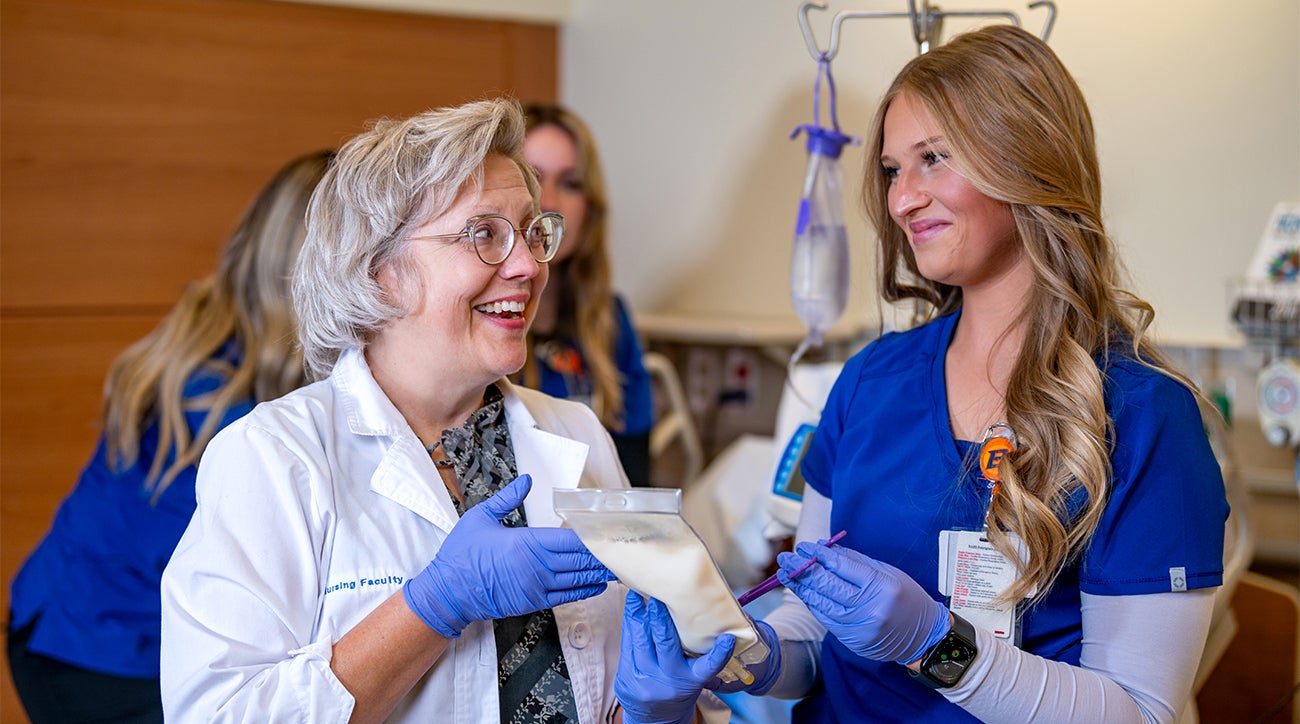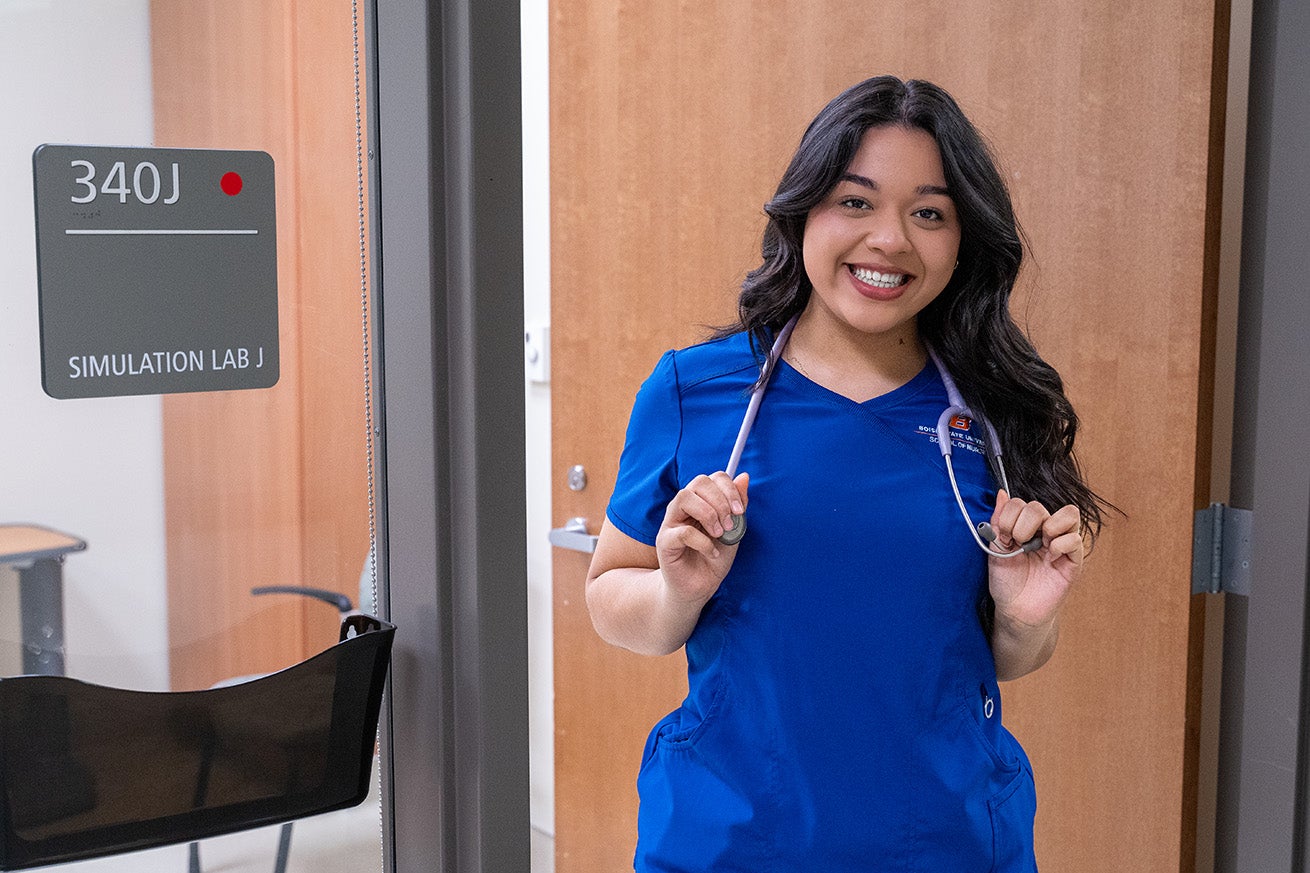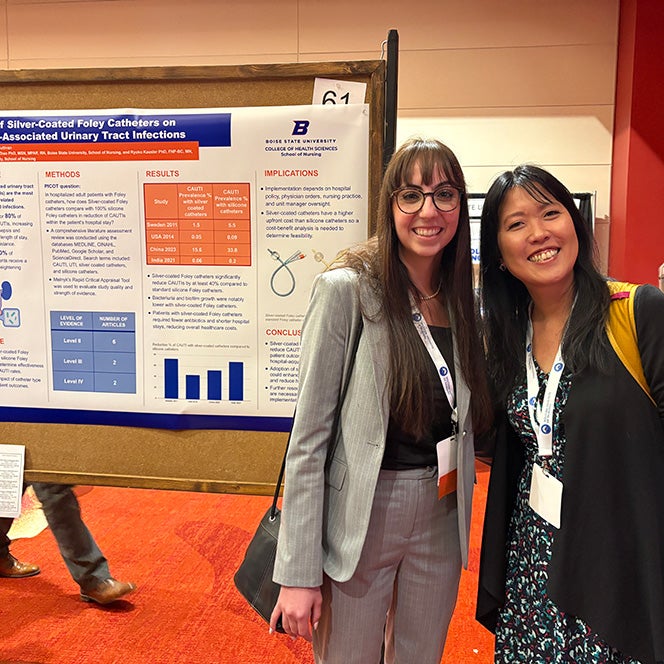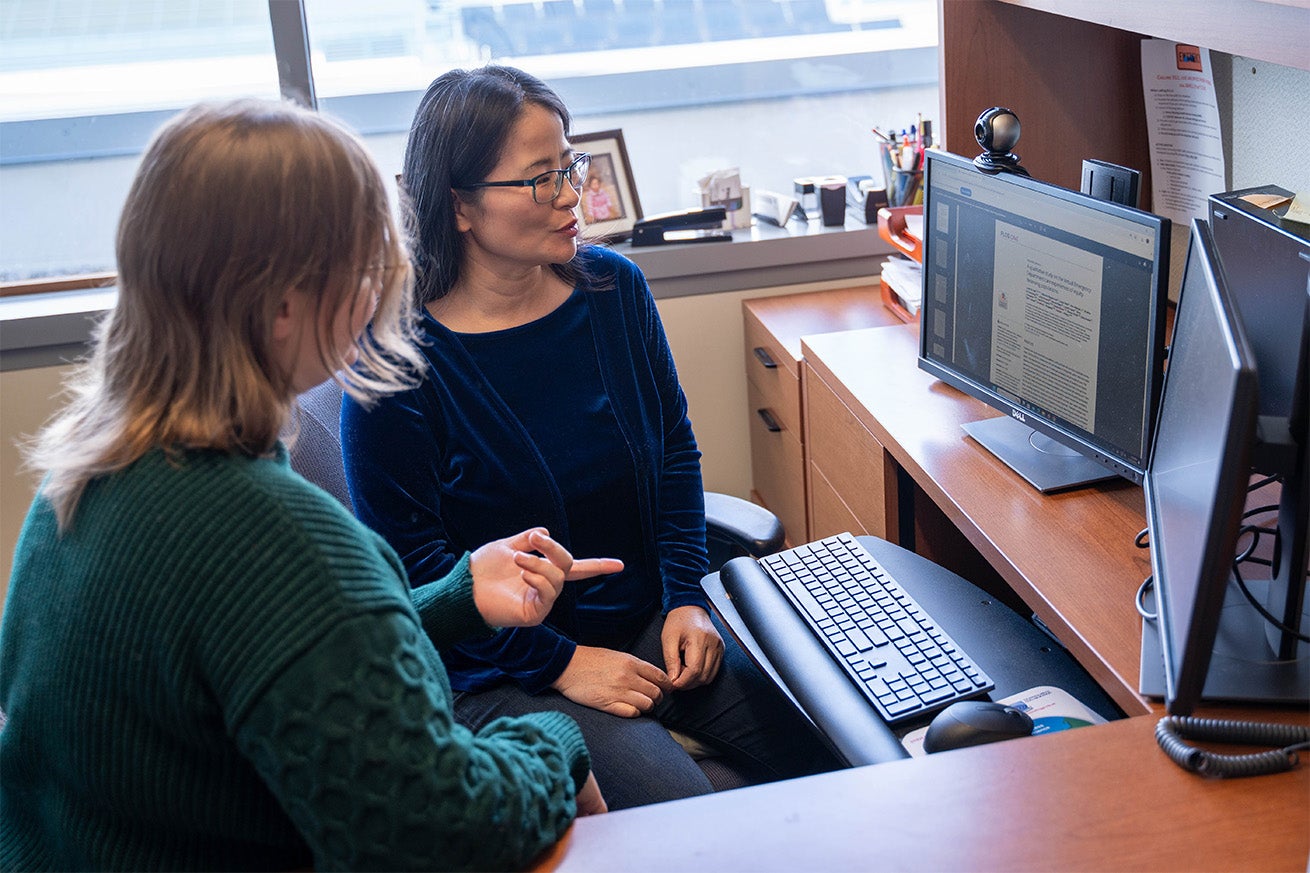2025 is a record-setting year for the School of Nursing: 18 students in the on-campus undergraduate nursing program are working as research assistants.
While that number may not seem that large, consider it in context of the nursing cohort sizes: each group is 80 students, equating the number of research assistants to over 20% of one cohort.
Not only are students eager about research, but faculty and staff scholarly output has skyrocketed, as well. In the last three years, the number of publications and presentations increased over 500%, and grant funding increased over an astounding 4,000%.

While this scholarship might seem unrelated to patient care, the health of Idaho is at the heart of Boise State’s faculty and student work. Advancing nursing education and patient-centered research means individuals, families and whole communities will receive the highest-quality care from Boise State graduates.
“Research, by definition, should be generalizable for larger populations, but what has inspired much of our research is what we see here, in practice,” said Amy Spurlock, professor and the JoAnna “Jody” DeMeyer Endowed Chair in Nursing. “The work of our faculty and student research assistants often focuses on improving health outcomes right here in Idaho.”
Why is this year different?
There are several contributing factors to the school’s skyrocketing scholarly activity.
Endowment increases support for scholarship
One is the reinstallment of the JoAnna “Jody” DeMeyer Endowed Chair in Nursing. Professor Amy Spurlock stepped into the role in August 2024 and, since then, has focused on providing increased infrastructure and support for scholarship in the school.
Spurlock has been guiding the undergraduate research assistants, providing more concentrated training in topics like writing abstracts and presenting research. She centralized research resources so they’re more easily accessible for faculty and students, and she hosted a research and scholarship workshop in the fall for faculty and staff.

Support also comes in intangible forms. While academia often breeds a culture of competition, Spurlock instead fosters celebration and recognition of others.
She frequently highlights the successes of her fellow faculty and encourages teamwork beyond traditional borders. She established unique mentorships between clinical-track and tenure-track faculty, effectively investing in their career development and simultaneously widening the breadth of the school’s scholarly output.
“Dr. Amy Spurlock brings her gift of vision, heart and expertise to her role in the School of Nursing,” said Kelley Connor, the school’s interim divisional dean. “As a dedicated nurse, educator and researcher, she is skilled at mentoring both students and faculty. She dedicates herself to building meaningful partnerships that open doors for others to pursue scholarship, and we are incredibly proud to have her serving as our endowed chair.”
Spurlock’s own research has advanced in the last year, as well. In March, she and clinical associate professor Jennifer Marsh published their team’s work on blended tube feeding.
Spurlock also cultivates collaboration across the university, partnering in April with Ruth Jebe, associate professor and the Robert V. Hansberger Chair of Business Ethics in the College of Business and Economics. Together they organized a roundtable discussion about resilient supply chains using a healthcare care study.
A drive to innovate
The school’s increase in research assistant involvement and creative activity may also have to do with Boise State’s culture of innovation. Thanks to advancements in curriculum, undergraduate students are now applying design-thinking to solving problems in healthcare.
And they’re not restricting their ideas to the classroom.

“There’s nobody better than those that are interacting with patients directly and experiencing the problems and lack of innovations within healthcare…to actually make a difference,” said nursing student Aja Wilson.
Wilson and her classmate Erin Miller are building the future of healthcare technology with an idea born in their innovations class.
They’ve won two pitch competitions, interviewed hospital staff and sought the help of individuals with expertise in patents and coding. They continually receive positive feedback on their idea, aiming to create a product that could soon be integrated into hospitals.

What’s so special about nursing research assistants?
Students in clinical health sciences programs have very full workloads. In addition to their classroom assignments, they must complete clinical hours in the workplace to demonstrate they’re prepared to practice. Depending on each semester’s requirements, nursing students spend anywhere between 135 and 225 hours in the field.
Additionally, many students work full or part time to pay for school, housing or food. Add a research assistantship on top, and you might look at their schedule wondering, “When are they going to sleep?”
But students who get involved are passionate about what they do. “I feel like this research has taken me in,” said junior Hannya Ornelas.
Ornelas works with assistant professor Kate Doyon researching hospice and palliative care for refugees.
“I was very hesitant at first to even talk about palliative and hospice care, but I think being able to do this has not only made me a better student, but also changed my perspective,” Ornelas said.

“The RAs bring so much energy, excitement and passion for improving the students’ understanding of important nursing concepts,” said Tracee Chapman, Interim Director of Simulation-based Education and Research. “Their dedication to implementation science is critical for improving their future patient interactions and outcomes.”
Nursing undergraduate research assistants experience the gamut of Boyer’s model of scholarship, from making new discoveries to applying and integrating knowledge, as well as teaching it. They partner with faculty on interdisciplinary projects, advance scholarship in the Simulation Center and assist in curriculum development.
“All research impacts people in some way, but I like that I can see the direct impact, knowing we’re developing simulations for my program that I may see in the future or people I may know might go through,” said junior nursing research assistant Grace Ellison.
Student scholarly successes
The nursing undergraduate research assistants consistently aim high and exceed expectations in their research endeavors.

In 2025, four were awarded IFITS scholarships, and two of 16 lightning talks during the Undergraduate Research Showcase were given by nursing students.
Beyond Boise State, eight students had projects accepted to the annual Western Institute of Nursing conference. While there, junior Sydni Sullivan received one of only five awards for an “abstract of distinction.” Sullivan works with associate professors Jenny Alderden and Lucy Zhao, and she represents a sliver of the scholarly success the research assistants demonstrated at the conference.
Every April students participate in Wester Institute of Nursing and every year they stand out from the crowd. They are often the only undergraduate students presenting, and their research is often mistaken for PhD-level work. This year was no different.
“It was a joy to watch them present their work and interact with other students, faculty, and even other university deans,” Spurlock said. “They made us very proud.”
Research for Idaho
Nursing faculty advance patient-centered scholarship through their classroom and clinical teaching, as well as more traditional forms of research.
In August 2024, assistant professor Jason Blomquist was awarded a Generative Artificial Intelligence in Higher Education fellowship by the Idaho State Board of Education. He has been partnering with faculty across the state to learn about AI in education, as well as with a team of scholars from the School of Nursing to study AI uses in nursing.
In addition to his AI work, Blomquist was recently published in The Conversation for his doctoral studies around nursing workplace violence.
Boise State is also cultivating a culture of nursing science in the community.

Lucy Zhao holds a joint appointment with St. Luke’s Health System, simultaneously teaching Boise State students and advancing research within a local hospital.
“I really hope that through the collaboration we can promote more nursing research in the clinical setting,” Zhao said.
Not only does she mentor Boise State undergraduate research assistants, but she also serves as a mentor for St. Luke’s nurse scientist apprenticeship program.
“Dr. Zhao’s research provides invaluable insights and implications into how nurses and other healthcare professionals can positively impact quality of care,” said Laura Tivis, director of nursing research at St. Luke’s Health System. “Her research speaks directly to St. Luke’s mission to improve the health of people in the communities we serve, and interconnects with strategic objectives to advance the safety of the care we provide.”